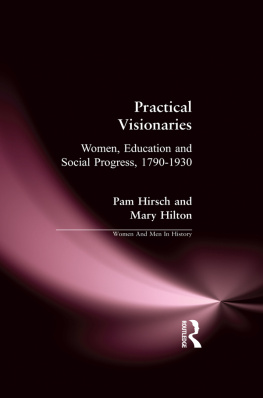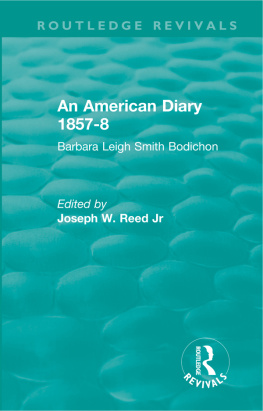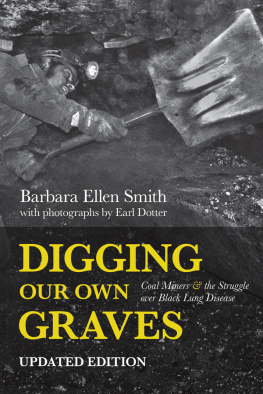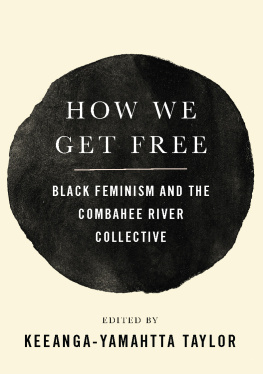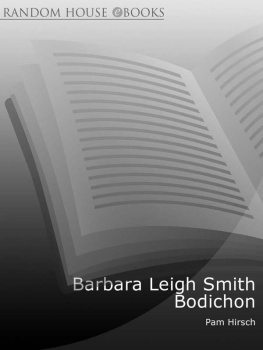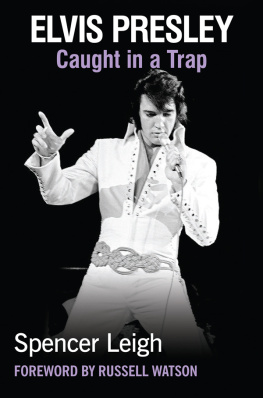WOMEN'S SOURCE LIBRARY
WOMEN'S SOURCE LIBRARY
VOLUME I
The Education Papers
Edited by Dale Spender
VOLUME II
The Radical Women's Press of the 1850s
Edited by Ann Russo and Cheris Kramarae
VOLUME III
Barbara Leigh Smith Bodichon and the Langham Place Group
Edited by Candida Ann Lacey
VOLUME IV
The Revolution in Words
Edited by Lana F. Rakow and Cheris Kramarae
VOLUME V
Before the Vote was Won
Edited by Jane Lewis
VOLUME VI
The Sexuality Debates
Edited by Sheila Jeffreys
VOLUME VII
Women's Fabian Tracts
Edited by Sally Alexander
VOLUME VIII
Suffrage and the Pankhursts
Edited by Jane Marcus
VOLUME IX
The Non-Violent Militant
Edited by Carol McPhee and Ann Fitzgerald
Women's Source Library
VOLUME III
Barbara Leigh Smith Bodichon and the
Langham Place Group
Edited by
Candida Ann Lacey
London and New York
First published 1987 by Routledge
This edition first published 2001
by Routledge
2 Park Square, Milton Park, Abingdon, Oxon, OX14 4RN
Simultaneously published in the USA and Canada
by Routledge
270 Madison Ave, New York NY 10016
Routledge is an imprint of the Taylor & Francis Group
Transferred to Digital Printing 2008
Editorial material and selection ) 1987, 2001 Candida Ann Lacey; individual owners retain copyright in their own material.
Typeset in Times by Keystroke, Jacaranda Lodge, Wolverhampton
All rights reserved. No part of this book may be reprinted or reproduced or utilised in any form or by any electronic, mechanical, or other means, now known or hereafter invented, including photocopying and recording, or in any information storage or retrieval system, without permission in writing from the publishers.
British Library Cataloguing in Publication Data
A catalogue record for this book is available from the British Library
Library of Congress Cataloging in Publication Data
A catalog record for this book has been requested
ISBN 0-415-25669-0 (set)
ISBN 0-415-25688-7 (volume III)
Publisher's note
The publisher has gone to great lengths to ensure the quality of this reprint but points out that some imperfections in the original book may be apparent.
Contents
In 1849, when she was twenty-two, Barbara Leigh Smith complained that philosophers and reformers have generally been afraid to say anything about the unjust laws of society and country which crush women. She added, optimistically, but now I hope that there are some who will brave ridicule for the sake of common justice to half the people in the world (1849: pp. 12). It was this concern which made Barbara Bodichon, as she was to become, brave ridicule herself and initiate the most important campaigns for women's rights to take place in Victorian England. Her pioneering schemes to improve the status of women would make the following twenty years some of the richest in debate and reform.
Never before had the woman question been so widely discussed. Committees were formed and petitions demanding married women's property rights and, later, enfranchisement were presented to Parliament; from these committees, others developed and instigated further plans for practical and immediate changes particularly in areas of education and employment for women which were less dependent for their success on the attitude of the government or the state of Parliamentary business. The English Woman's Journal, which Barbara Bodichon had founded and financed, provided a public platform for the major feminist writings of the period whilst its offices, in Langham Place, formed the administrative centre of the Society for Promoting the Employment of Women. The task which faced the Langham Place Group, as Barbara Bodichon and her colleagues came to be known, was daunting. Before new ground could be gained, public opinion had to be changed. A wall of prejudice had to be dismantled brick by brick until the image of Victorian femininity crumbled, releasing women to claim their right to legal justice and a viable livelihood. Most of the women at Langham Place accepted as axiomatic the need to convert their opponents by persuasion rather than by direct confrontation. How else would they win the parliamentary majority needed to support the controversial Married Women's Property Bill or to introduce the suffrage? Similarly, powerful sympathisers were needed if male-dominated professional and educational establishments were ever going to open their doors to women. It would be a slow process and, although significant gains were made, other changes would take much longer. The articles reprinted in this collection articles published in The English Woman's Journal, papers read at the newly formed National Association for the Promotion of Social Science and pamphlets printed by Emily Faithful's task force of women compositors at the Victoria Press are a testament to this struggle for slow and sometimes minimal rewards and an illustration of some of the difficulties involved in seeking to stretch the limits within which Victorian women were expected to live. Moreover, these articles reveal the complexity of that struggle: the diversity which quickly becomes apparent, not only in the range of projects which were undertaken but also in the attitude and political outlook of the women involved, denies us that temptation to reconstruct an idealised, unshakeable sisterhood. Particular circumstances and individual reasons brought each of these women into contact with the Langham Place Group; behind their common concern to improve women's rights, a welter of motives exists which would certainly reward further study and investigation. For it is in these different, and sometimes conflicting, voices that we can understand the strengths and the weaknesses of Victorian feminism. What emerges from the sample reprinted here is the comparative radicalism of Barbara Bodichon: both her clarity of purpose and her specific angle of vision, uncluttered by the social and political assumptions of some of her contemporaries, mark her as a forerunner of the modern women's movement.
Barbara Bodichon was an atypical Victorian woman; in many ways she was ahead of her time and enjoyed a liberty which was unknown to her peers. Her father had taken the unconventional step of providing each of his five children daughters as well as sons with a 300 annuity as soon as they came of age. Hence, Barbara's independence was assured and the image of this unorthodox freedom was reinforced two years after her twenty-first birthday when she and Bessie Rayner Parkes, her childhood friend who would become the editor of The English Woman's Journal, set off together for an unchaperoned tour of Europe. The advantage of an upbringing and an education (at the radical Westminster School) usually reserved for male children could not erase the circumstances of her birth, however. Benjamin Leigh Smith, a Liberal MP, and Anne Longdon, a milliner's apprentice nearly thirty years his junior, were never married. Whether or not they would have married eventually is uncertain but when Barbara, their eldest child, was 7, her mother died. Social criticism and ostracism were inevitable: the Smith children were Florence Nightingale's illegitimate cousins and known as the tabooed family (Haight, 19545, vol. II, p. 45). Mrs Gaskell once speculated as to the effect of Barbara's illegitimacy: she is I think in consequence of her birth, a strong fighter against the established opinions of the world I can't help admiring her noble bravery, and respecting while I don't personally


